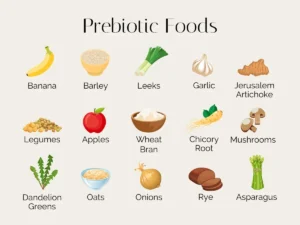In digestive health, “probiotics” and “prebiotics” often appear together, but they serve different roles. Probiotics are live beneficial bacteria that support the gut microbiome, while prebiotics nourish these bacteria. Prebiotics are naturally occurring fibres in plant-based foods that fuel the growth of beneficial gut microorganisms. They act as nourishment for good bacteria, helping them thrive. By promoting a healthy microbiome, prebiotics support digestive health, immune function, and overall well-being. In essence, prebiotics plays a crucial role in maintaining the balance of gut bacteria and supporting a healthy digestive system.
What Are Prebiotics?
Prebiotics are non-digestible food components, primarily fibres, that pass through the stomach and small intestine undigested. They reach the colon, where they feed beneficial bacteria, stimulating their growth. In essence, prebiotics act as fertilizer for gut bacteria, helping them thrive.
The gut microbiome contains trillions of microorganisms, including bacteria, fungi, and viruses, which perform essential functions like nutrient metabolism, immune regulation, and supporting mental health. A disrupted microbiome, known as dysbiosis, is linked to health issues like digestive disorders, obesity, and mental health problems. Prebiotics help maintain a balanced microbiome, supporting optimal gut health.
How Do Prebiotics Work?
When consumed, prebiotics are not digested in the stomach or small intestine but are fermented in the large intestine. This fermentation produces short-chain fatty acids (SCFAs) like acetate, propionate, and butyrate. SCFAs have multiple benefits:
- Supporting Gut Health: SCFAs provide energy to colon cells, maintaining a healthy gut lining, which acts as a barrier to harmful substances.
- Regulating Intestinal pH: Prebiotics lower the pH in the colon, creating an acidic environment that encourages beneficial bacteria and inhibits harmful ones.
- Anti-inflammatory Effects: Butyrate, in particular, has anti-inflammatory properties that can reduce gut inflammation and may help prevent inflammatory bowel disease (IBD).
- Strengthening the Immune System: Prebiotics stimulate beneficial bacteria, which help regulate the immune response, improving overall immune function.
Health Benefits of Prebiotics
Prebiotics offer various health benefits, primarily through their positive impact on gut health. Some key benefits include:
- Improved Digestion: Prebiotics promote the growth of beneficial gut bacteria, regulating bowel movements, preventing constipation, and boosting mineral absorption, including calcium and magnesium, essential for strong bones.
- Stronger Immunity: By nourishing beneficial bacteria, prebiotics support a balanced microbiome, enhancing immune responses and protecting against infections.
- Better Blood Sugar Control: Prebiotics like inulin slow sugar absorption, stabilizing blood sugar levels and improving insulin sensitivity, particularly for those with type 2 diabetes or prediabetes.
- Weight Management: Prebiotics help regulate appetite hormones, reducing cravings for sugary foods and supporting weight control.
- Improved Mental Health: Prebiotics influence the gut-brain axis, stimulating mood-regulating neurotransmitters like serotonin and potentially reducing anxiety and depression.
- Enhanced Nutrient Absorption: Prebiotics boost the absorption of nutrients like calcium, supporting bone health and reducing osteoporosis risk.
Sources of Prebiotics

Prebiotics are naturally found in a variety of plant-based foods rich in fibre. Some of the best sources include:
- Resistant Starch: Found in foods like boiled and chilled potatoes, green bananas, oats, and beans, resistant starch reaches the colon, where it feeds beneficial bacteria.
- Inulin: A soluble fibre found in asparagus, garlic, onions, leeks, and Jerusalem artichokes. Inulin supports gut health, stabilizes blood sugar levels, and promotes beneficial bacteria growth.
- Pectin: A soluble fibre found in fruits like apples, apricots, and citrus. Pectin has antioxidant properties and supports gut health by protecting the gut lining.
- Other Prebiotic Foods: Bananas, dandelion greens, chicory root, oats, soybeans, and flaxseeds are also good sources. Prebiotics are also added to some processed foods like cereals, bread, and yoghurt to enhance nutritional value.
For those who find it difficult to consume enough prebiotic-rich foods, supplements like inulin or fructooligosaccharides are available. However, whole food sources are recommended for optimal nutrient intake.
How to Incorporate Prebiotics into Your Diet
Adding prebiotics to your diet can be simple and enjoyable. Here are a few tips:
- Add garlic and onions: These versatile ingredients can be used in various savoury dishes.
- Eat whole grains: Foods like oats, barley, quinoa, and brown rice are rich in prebiotics.
- Snack on bananas: Bananas are rich in prebiotics and provide potassium, which supports heart health.
- Enjoy fruits and vegetables: Asparagus, leeks, apples, and chicory are excellent sources of prebiotics.
By making small dietary changes, you can easily increase your intake of prebiotics and enjoy their health benefits.
Potential Side Effects
Prebiotics are generally safe for most people but can cause digestive discomfort if consumed in large amounts. Some individuals may experience bloating, gas, or abdominal pain. If you’re new to prebiotics, it’s best to start with small amounts and gradually increase intake to allow your digestive system to adjust. People with digestive conditions like irritable bowel syndrome (IBS) or small intestinal bacterial overgrowth (SIBO) should exercise caution, as certain prebiotics may worsen symptoms. Consult a healthcare provider if you have concerns.
Conclusion
Prebiotics are a vital part of a healthy diet, supporting digestive health and overall well-being. By feeding beneficial bacteria in the gut, prebiotics help maintain a balanced microbiome, which is essential for immune function, blood sugar regulation, mental health, and nutrient absorption. Incorporating prebiotic-rich foods into your diet can improve digestion, support weight management, and enhance mood. With their wide array of health benefits, prebiotics are a simple yet powerful tool for achieving better health.
 Food Manifest
Food Manifest 

















